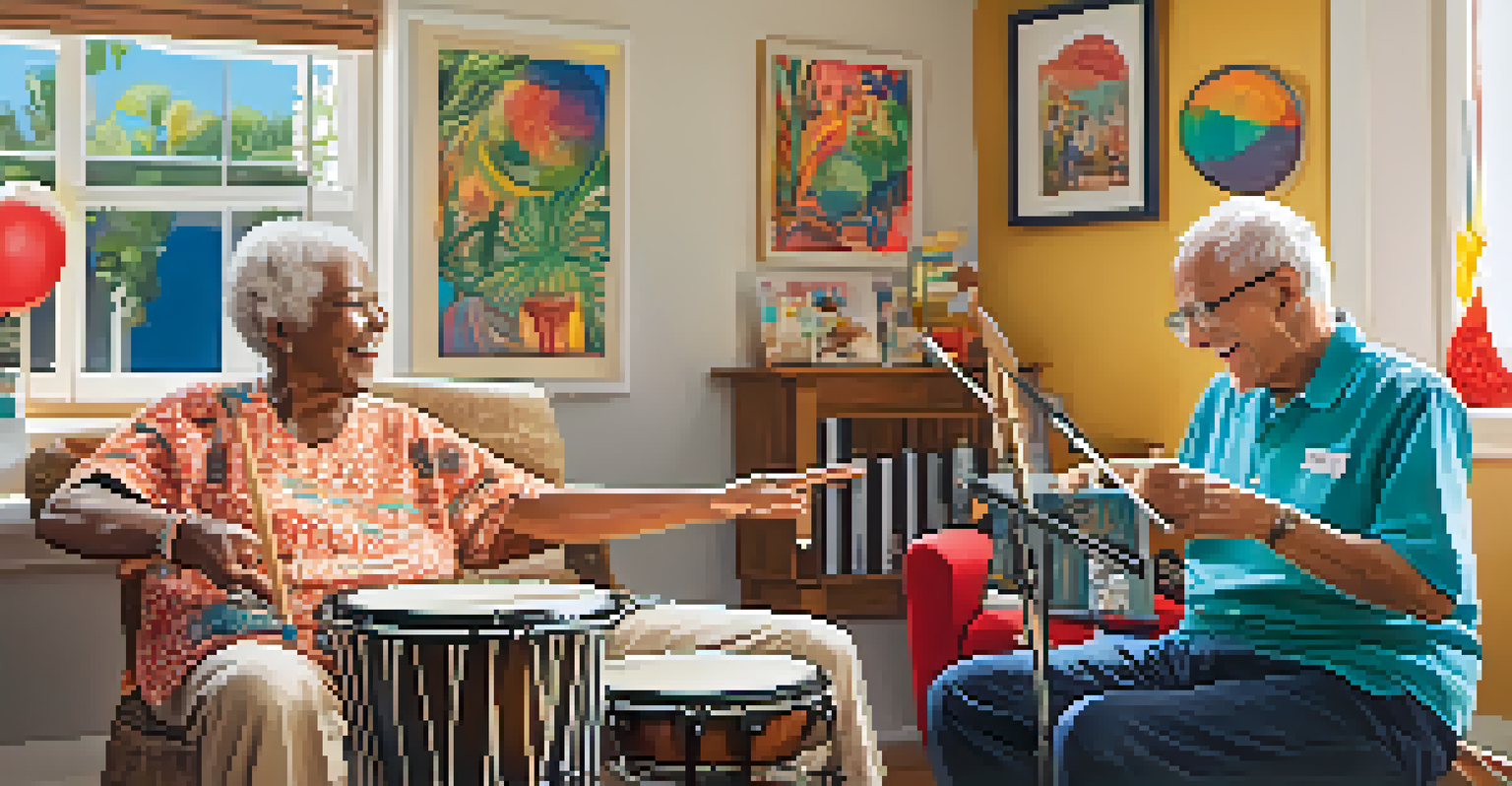The Role of Music in Palliative Care for Older Adults

Understanding Palliative Care and Its Importance
Palliative care focuses on providing relief from symptoms and stress of serious illnesses, particularly for older adults. It aims to improve the quality of life for patients and their families by addressing physical, emotional, and spiritual needs. This holistic approach recognizes that care isn’t just about treating a disease; it’s about caring for the whole person.
Music can change the world because it can change people.
Older adults often face multiple health challenges, making palliative care essential. By prioritizing comfort and quality of life, palliative care allows patients to spend their remaining time in the most meaningful way. Incorporating various therapies, including music, can significantly enhance this experience.
Understanding how music fits into this framework can open up new avenues for improving patient well-being. It creates a bridge between caregivers and patients, fostering connection and communication during difficult times.
The Emotional Benefits of Music for Older Adults
Music has a unique ability to evoke emotions and memories, making it a powerful tool in palliative care. For older adults, familiar tunes can spark joyful recollections and provide comfort during challenging times. This emotional connection can ease feelings of anxiety, depression, and loneliness.

When listening to music, patients often experience a sense of nostalgia, which can be reassuring. This emotional resonance helps them feel more connected not only to their past but also to those who care for them. Music can serve as a gentle reminder of happier times, lifting spirits in a profound way.
Personalized Music Boosts Healing
Tailoring music experiences to individual preferences can significantly enhance the therapeutic effects of music in palliative care.
Moreover, music therapy sessions can be tailored to individual preferences, ensuring that each patient engages with music that speaks to them personally. As a result, these sessions become an emotional lifeline, promoting a sense of peace and acceptance.
Physical Healing: How Music Affects the Body
Beyond emotional benefits, music can also have tangible physical effects on older adults. Research has shown that music can lower blood pressure, reduce pain, and even enhance sleep quality. For patients dealing with chronic illnesses, these benefits can lead to a better overall experience.
The greatest gift of human beings is that we have the power of empathy.
Listening to soothing music can trigger the release of endorphins, the body's natural painkillers. This relief can be particularly valuable for those in palliative care, where managing pain is a primary concern. The calming effects of music can also help ease muscle tension and promote relaxation.
In essence, music serves as a complementary therapy, working alongside traditional medical treatments. By integrating music into care plans, healthcare providers can foster a more comprehensive approach to patient wellness.
Creating a Personalized Music Experience
One of the most effective ways to harness music in palliative care is through personalization. Every individual has unique tastes and preferences, and understanding these can significantly enhance the therapeutic effects of music. Tailoring playlists to include songs that resonate with each patient can create a more impactful experience.
Family members can play a crucial role in this process by sharing favorite songs or artists that hold special meaning. These personal touches can make music sessions feel more intimate and engaging. Additionally, caregivers can take the time to learn about the patient’s musical history, creating a deeper bond.
Palliative Care Enhances Quality of Life
Palliative care focuses on improving the overall well-being of patients by addressing their physical, emotional, and spiritual needs.
By involving patients in the selection process, caregivers empower them to express their preferences. This not only fosters a sense of autonomy but also ensures that music becomes a source of joy and comfort during their care.
Music Therapy: A Professional Approach
Music therapy is a specialized field that employs musical interventions to achieve specific therapeutic goals. Trained music therapists work with patients to help them express emotions, cope with pain, and improve their quality of life. This professional approach adds an extra layer of expertise to the use of music in palliative care.
During therapy sessions, therapists may use instruments, singing, or guided imagery with music to engage patients. These activities can be tailored to meet individual needs, whether that’s fostering relaxation or stimulating cognitive function. The versatility of music therapy makes it an invaluable asset in palliative care settings.
As research continues to highlight the benefits of music therapy, more healthcare facilities are integrating it into their palliative care programs. This trend underscores the importance of having trained professionals who can effectively harness the power of music.
The Role of Family in Musical Engagement
Family involvement can amplify the benefits of music in palliative care. When family members participate in music sessions, it creates a supportive environment that fosters emotional connection. This shared experience can help strengthen relationships and provide comfort to both patients and their loved ones.
Families can also facilitate music engagement outside of therapy sessions by bringing favorite songs or creating a playlist. This simple act can make a significant difference in a patient’s mood and overall well-being. Additionally, singing or playing instruments together can become a cherished activity that brings joy.
Music Provides Emotional Support
Music can evoke positive emotions and memories, offering comfort and reducing feelings of anxiety and loneliness for older adults.
By encouraging family participation, caregivers can create a more holistic approach to palliative care. This collaboration not only enriches the patient’s experience but also allows families to share in the healing process.
Looking Ahead: The Future of Music in Palliative Care
As awareness of the benefits of music in palliative care grows, the future looks promising. More healthcare providers are recognizing the role of music as a vital component of holistic patient care. This shift reflects a broader understanding that well-being encompasses emotional, physical, and spiritual health.
Innovations in technology are also paving the way for more accessible music resources. From streaming services to apps designed for music therapy, patients can easily access their favorite tunes whenever they want. These technological advancements enhance the ability to personalize music experiences.

Looking ahead, integrating music into palliative care practices will likely become standard. By prioritizing the role of music, we can continue to improve the quality of life for older adults facing serious illnesses.